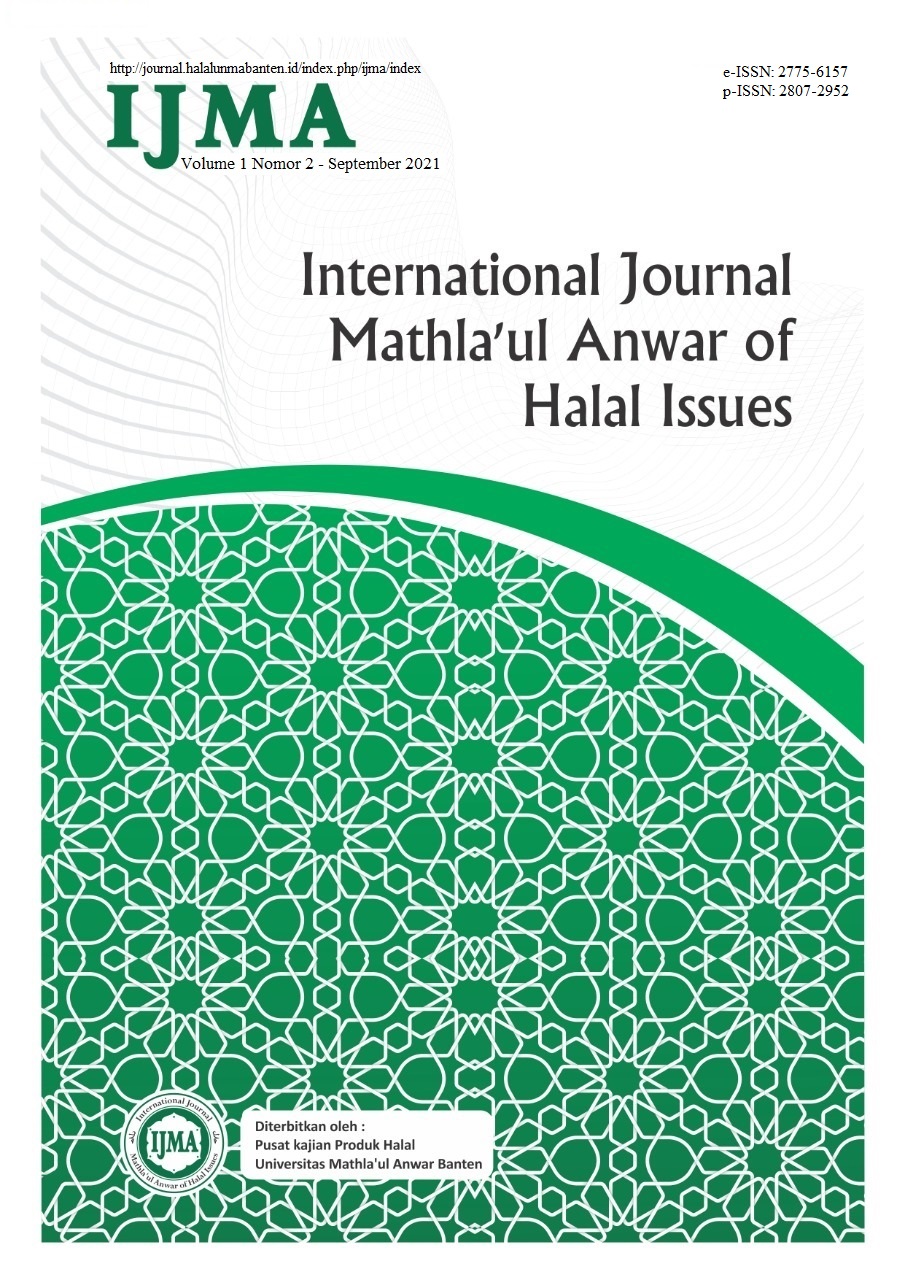PERSEPSI LABEL HALAL PADA PRODUK MAKANAN DALAM KEMASAN OLEH MAHASISWA STKIP BABUNNAJAH PANDEGLANG BANTEN
Keywords:
Moslem, Halal, Packaged productsAbstract
Indonesia is a nation with moslems as the largest populations. As a nation with vast ranging cultures, Indonesia does also have many kinds of culinary and beverages. In a moslem community Halal status is important as a guideline for moslems. Therefore, MUI gives halal label so that people is easier to identify halal products. There are two problems in this research to focus. The first is about the implementation of halal label by MUI in the packaged food and drink products. The second focus is on how is the perception of students in STKIP Babunnajah toward the halal labialization of packaged food and drink products. This research used descriptive qualitative research approach. The instrument used to collect the data was by questionnaires delivered through google form. There were 15 questions in the questionnaires investigating products’ halal status. There were 40 respondents of the research consisting of 10 students for each year level. The study showed that halal label issued by MUI for packaged food and drink products has gone through careful examination by MUI. Moreover, the students in STKIP Babunnajah has the perception that halal product labeling was in accordance to sharia law.
References
Baharuddin, K., Kassim, N. A., Nordin, S. K., & Buyong, S. Z. (2015). Understanding the Halal Concept and the Importance of Information on Halal Food Business Needed by Potential Malaysian Entrepreneurs. International Journal of Academic Research in Business and Social Sciences, 5(2), 170-180.
Battour, M., & Ismail, M. N. (2016). Halal tourism: Concepts, practises, challenges and future. Tourism Management Perspectives, 19, 150-154.
Bigliardi, B., & Galati, F. (2013). Innovation trends in the food industry: The case of functional foods. Trends in Food Science & Technology, 31(2), 118-129.
Bonne, K., & Verbeke, W. (2008). Muslim consumer trust in halal meat status and control in Belgium. Meat Science, 79(1), 113-123.
Bremner, H. A. (2000). Toward Practical Definitions of Quality for Food Science. Critical Reviews in Food Science and Nutrition, 40(1), 83-90.
El-Gohary, H. (2016). Halal tourism, is it really Halal? Tourism Management Perspectives, 19, 124-130.
Hutkins, R. W., Krumbeck, J. A., Bindels, L. B., Cani, P. D., Fahey, G., Goh, Y. J., et al. (2016). Prebiotics: why definitions matter. Current Opinion in Biotechnology, 37, 1-7.
Jaafar, H. S., Endut, I. R., Faisol, N., & Omar, E. N. (2011). Innovation in logistics services - halal logistics (No. 34665). Kuala Lumpur: Universiti Teknologi MARA.
Kamaruddin, R., Iberahim, H., & Shabudin, A. (2012). Willingness to Pay for Halal Logistics: The Lifestyle Choice. Procedia - Social and Behavioral Sciences, 50, 722-729.
Marzuki, S. Z. S., Hall, C. M., & Ballantine, P. W. (2014). Measurement of Restaurant Manager Expectations toward Halal Certification Using Factor and Cluster Analysis. Procedia - Social and Behavioral Sciences, 121, 291-303.
Mohsin, A., Ramli, N., & Alkhulayfi, B. A. (2016). Halal tourism: Emerging opportunities. Tourism Management Perspectives, 19, 137-143.
Nakyinsige, K., Man, Y. B. C., & Sazili, A. Q. (2012). Halal authenticity issues in meat and meat products. Meat Science, 91(3), 207-214.
Noviyanto, F., Nuriyah, S., & Susilo, H. (2020). Uji Aktivitas Antibakteri Sediaan Sabun Cair Ekstrak Daun Mengkudu (Morinda citrifolia L.) Terhadap Staphylococcus aureus. Journal Syifa Sciences and Clinical Research, 2(2), 55–64. https://doi.org/10.37311/jsscr.v2i2.7016
Samori, Z., Md Salleh, N. Z., & Khalid, M. M. (2016). Current trends on Halal tourism: Cases on selected Asian countries. Tourism Management Perspectives, 19, 131-136.
Subekhi, A.I, & Oktavia, S. (2021). Studi Etnomatematika: Kain Berbahan Dasar Halal Ditinjau Dari Motif Sadulur Batik Lebak Provinsi Banten. International Journal Mathla'ul Anwar of Halal Issues, Vol 1(1), Hal 27-29.
Subekhi, A.I, & Oktavia, S. (2021). Public Relations Campaign In Disseminating Halal Food and Beverages to Elementary School Students and The Community. International Journal Mathla'ul Anwar of Halal Issues Vol 1(2), Hal 57-63.
Talib, M. S. A., & Johan, M. R. M. (2012). Issues in Halal Packaging: A Conceptual Paper. International Business and Management, 5(2), 94-94.
Zulfakar, M. H., Anuar, M. M., & Talib, M. S. A. (2014). Conceptual Framework on Halal Food Supply Chain Integrity Enhancement. Procedia - Social and Behavioral Sciences, 121, 58-67.


